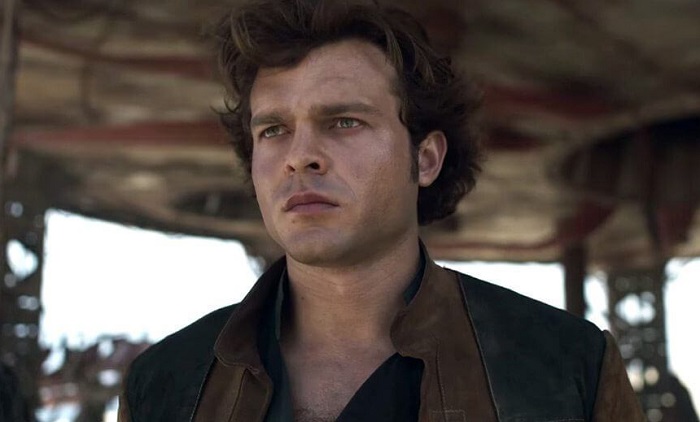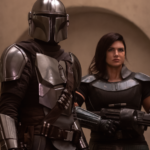
Some Solo spoilers to follow …
The first weekend box-office receipts are in for Solo, and they're kind of a disaster. The Star Wars film made about $83 million in its first three days, just a bit more than half of what Rogue One, the saga's first spin-off, pulled in its first weekend. And international business is even worse, with the movie only pulling an extra $65 million from the rest of the world. It's bad news for Lucasfilm execs, who need to quickly figure out what went wrong, as a slew of additional spinoff films (some focused on such characters as Boba Fett and Obi-Wan Kenobi) are currently in the pipeline.
There are a lot of different theories about why there seems to be such public disinterest in Solo. Sure, Star Wars fatigue probably plays its part. We used to get a new Star Wars movie only every three years with large gaps in between trilogies; Disney has given us four films in the last three and a half years. The Last Jedi opened just five months ago. Also, there is almost certainly a contingent of folks who were just not interested in seeing a version of Han Solo not played by Harrison Ford, still the movie star of choice for many a 40 and 50-year old.
Still, I think the single biggest problem Solo faced was one that I predicted five years ago when Disney first bought Lucasfilm: Prequels, by their nature, are a dramatically-crippled form of storytelling. Of course Han was going to meet Chewie in Solo. Of course he and Lando were going to have a mutually prickly relationship. Of course all three were going to make it out alive, and Han was going to end up with the Millennium Falcon. We already knew these things going in. Sure, we had some mini-surprises — the shockingly high death toll among the new characters, that bitchin' cameo near the end — but those things aren't enough raise the conversation about the film to the point where the average moviegoer feels like they need to go see it.
Consider for a moment, the Marvel Cinematic Universe, Disney's other box-office juggernaut, which shows no signs of slowing. Why does almost every new installment that comes along seem to capture the zeitgeist? It's because every Marvel Studios release has people excited about what happens next. To some degree, Doctor Strange led into Thor: Ragnarok which led into the opening scene of Avengers: Infinity War. Even this July's Ant-Man and the Wasp, which reportedly takes place before Infinity War's climactic scenes, and next spring's Captain Marvel, Marvel's first true prequel, will almost certainly feature events that will tie into the plot of next summer's Avengers 4, and Marvel has primed their audience to know that, if you skip them, you'll fall behind the overall story.
No such contract with the audience exists when it comes to Solo. Its events will have no bearing on the next Star Wars film, Episode IX (subtitle to be determined), due December 2019. You didn't need to see Rogue One to understand anything else in the Star Wars universe. These are stand-alone films with predetermined endings thanks to their place on the timeline. It doesn't mean they can't be good movies — I loved Solo! — but it does mean they're incapable of stirring audience anticipation the same way the Marvel films do.
So what can Lucasfilm do about that? Well, the answer is obvious, even if it's antithetical to Lucasfilm's strategy of capitalizing on its most popular Star Wars characters: They need to stop making prequels. In fact, were I in charge, I'd make sure Episode IX ends in a place that can serve as fertile ground for tons of new Star Wars stories to grow out of. Have Rey reform the Jedi Order. Put Poe Dameron in charge of a permanent group of soldiers and pilots who pledge an oath to protect the galaxy from any threat that comes along. Establish a state of the galaxy that can drive stories that look not backward, but forward in time.
This is easier said than done for two reasons. One, somebody will need to convince Lucasfilm to move away from its popular classic characters. You'd think Solo's uninspiring box office would do that, but I'm worried Kathleen Kennedy and company might learn the wrong lesson and decide that a lack of Jedi and lightsabers is what sunk the movie. (God, what a disaster it would be if that's what they take from this.) The second reason the birth of a new, forward-looking Star Wars universe could be tricky is tied into the epic nature of the franchise itself. Marvel has it easy; whenever they want to give one of their characters a sequel, they just bring in a new villain for him or her to fight. Star Wars, however, traditionally finds its characters battling not just individual villains but entire evil regimes. The heroes are expected to stand against a large oppressive force, with hundreds of canon-fodder Stormtroopers available to be blasted. J.J. Abrams knew this, which is why The Force Awakens opens with the First Order re-establishing control of the galaxy. And that worked to an extent, but it also left the Order feeling like a watered-down version of the Empire. After they're (presumably) defeated in Episode IX, it's going to be pretty lame if the Empire is somehow able to reform a third time and prove to be a credible threat.
There's no apparent, easy solution to this problem. Maybe the Resistance doesn't win an outright victory at the end of Episode IX, leaving the galaxy in an ongoing state of turmoil that can serve as a backdrop for future films. Or maybe Lucasfilm can ditch their evil Empire and star telling smaller, more personal stories. It would be a change from what we expect from Star Wars, but Solo — which is, again, quite good and you should totally go see it if you haven't — proves those types of stories can work in this universe. One thing that should definitely happen: Let's have the Sith drop their stupid "rule of two" and flood the galaxy with a bunch of Force-using, evil badasses.
Whatever the answer, Lucasfilm's brain trust needs to find it and find it quick. It's been announced that The Last Jedi director Rian Johnson and Game of Thrones showrunners David Benioff and D.B. Weiss have their own new Star Wars trilogies in the pipeline. If those aren't already set post-Episode IX, they need to be retrofitted to be. And Lucasfilm needs to strongly consider if it wants to go through with all of the character-based prequels that have been either announced or rumored. Look, I'd selfishly take an Obi-Wan movie starring Ewan McGregor just because I think he was the best thing about George Lucas's original Star Wars prequels and deserves to play the character again. And, yeah, now I'd be fully on board with a Solo sequel too.
But those films aren't going to keep Star Wars in the worldwide pop-culture conversation, nor excite non-super fans to turn out to the theater en masse. That's not to say legacy characters can't live on somewhere. But that's what TV is for! Star Wars Rebels was great and showed that maybe it's easier to get away with timeline-jumping on the small screen. Lucasfilm currently has a live-action Star Wars series and another animated series in development. Those might be the best places to keep the classic characters alive and in fans' minds. The movies, however, need to start looking forward, or Star Wars is quickly going find itself playing second fiddle to not just Marvel, but every major franchise that keeps its fans frantically guessing about what happens next. Solo's disappointing opening-weekend box office proves that danger is very real.











